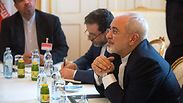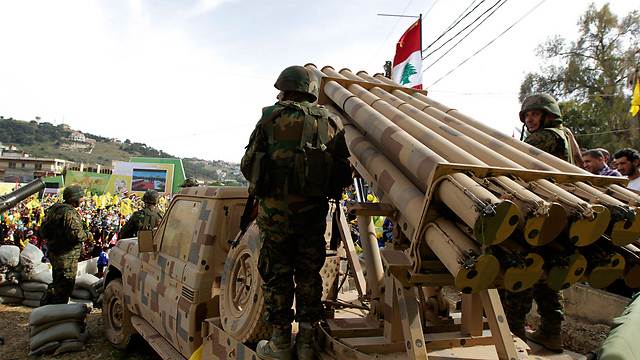
Iranian Foreign Minister Mohammad Zarif during nuclear talks in Vienna
צילום: AFP
Nuclear deal or not, Israel faces a dangerous future
Analysis: If Iran signs an agreement with the world powers, the billions of dollars it stands to receive will boost its strategic strength and support of terror; if an agreement isn't signed, Iran will speed up its attempts to reach a nuclear weapon and regional hegemony.
The target date has passed and Iran and the world powers have failed to reach an agreement yet, but the eagerness of the United States increases the chances that an agreement will be reached soon. Regardless of whether an agreement is signed or not – the outcome will be dangerous for Israel.

If an agreement is signed, we will face an Iran whose nuclear project may have been frozen, but the billions which will flow in following the removal of the sanctions will boost its strategic strength and its support of terror and subversion. If an agreement is not signed, Iran will speed up its attempts to reach a nuclear weapon and regional hegemony.
In both situations, Israel must take action in four different ways, each of which fulfills a necessary command.
The first command is creating a proper military response, both defensive and offensive. The defensive response must reinforce the home front defense against tens of thousands of missiles and rockets that are directed at the home front today. The current defense layout is still insufficient, both quantitatively and qualitatively, against Hezbollah's rocket arsenal in Lebanon.
The offensive response should give Israel the possibility to act against the Iranian nuclear weapon project on its own. In the new situation which could be created, this choice may be the last one left in our hands, and Israel must not remain helpless and depend on the mercy of foreigners under such difficult circumstances.

Hezbollah military parade. Israel's defense layout is still insufficient against the tens of thousands of missiles and rockets directed at its home front today (Photo: EPA) (צילום: EPA)
Another component of the military response is strengthening the intelligence abilities required to monitor any progress made by the Iranians in the development of the nuclear weapon.
The second command is changing Israel's international standing. Even without a direct conflict between Israel and Iran, a conflict with its emissaries – Hezbollah and Hamas – is inevitable in the coming years. The results of such conflicts, in Lebanon and Gaza, are largely determined by the timing of their cessation. The international community, through the Security Council, determines the length of the IDF's operation and whether it managed to achieve its goals.
Israel won't be able to fight its enemies properly with the occupation hump on its back. As the policy aimed at preventing the establishment of a Palestinian state continues, the diplomatic isolation will grow and Israel's military freedom of action will be limited. The second command, therefore, is launching peace negotiations as soon as possible with the purpose of ending the conflict and establishing a demilitarized Palestinian state on one-fifth of the Land of Israel.
The implementation of these two actions will allow the fulfillment of the third command – creating a regional alliance of Arab states with Israel. I am referring to Egypt, Jordan, Saudi Arabia and most of the Gulf states. The purpose of the regional alliance is to curb the ayatollah regime, thwart its intentions and speed up its internal overthrow. Israel, as a regional power which no longer prevents the establishment of a Palestinian state, will be a wanted and important member of this alliance.
The fourth command is restoring the special relationship between the Israeli government and the administration in Washington.
These four commands are intertwined, and the implementation of each of them strengthens the other three. But the key for successfully dealing with Iran in this new reality can actually be found in the second command, which is under a serious internal dispute in Israel. Creating the regional alliance and restoring the relationship with the US depend on a change in Israel's international standing. It has to do with changing the Israeli policy regarding to basic question – two states in the Land of Israel or one state.
In order to face Iran, this question must be determined. This is a decision everyone has managed to evade for nearly two decades.
Brigadier-General (res.) Dr. Ephraim Sneh is a former deputy defense minister and the current chairman of the S. Daniel Abraham Center for Strategic Dialogue at the Netanya Academic College.










